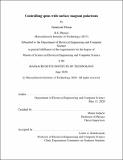Controlling spins with surface magnon polaritons
Author(s)
Sloan, Jamison(Jamison M.)
Download1192495421-MIT.pdf (2.016Mb)
Other Contributors
Massachusetts Institute of Technology. Department of Electrical Engineering and Computer Science.
Advisor
Marin Soljačić.
Terms of use
Metadata
Show full item recordAbstract
Polaritons in metals, semimetals, semiconductors, and polar insulators can allow for extreme confinement of electromagnetic energy, providing many promising opportunities for enhancing typically weak light-matter interactions such as multipolar radiation, multiphoton spontaneous emission, Raman scattering, and material nonlinearities. These extremely confined polaritons are quasi-electrostatic in nature, with most of their energy residing in the electric field. As a result, these "electric" polaritons are far from optimized for enhancing emission of a magnetic nature, such as spin relaxation, which is typically many orders of magnitude slower than corresponding electric decays. Here, we take concepts of "electric" polaritons into magnetic materials, and propose using surface magnon polaritons in negative magnetic permeability materials to strongly enhance spin-relaxation in nearby emitters. Specifically, we provide quantitative examples with MnF₂ and FeF₂, enhancing spin transitions in the THz spectral range. We find that these magnetic polaritons in 100 nm thin-films can be confined to lengths over 10,000 times smaller than the wavelength of a photon at the same frequency, allowing for a surprising twelve orders of magnitude enhancement in magnetic dipole transitions. This takes THz spin-flip transitions, which normally occur at timescales on the order of a year, and forces them to occur at sub-ms timescales. Our results suggest an interesting platform for polaritonics at THz frequencies, and more broadly, a new way to use polaritons to control light-matter interactions.
Description
Thesis: S.M., Massachusetts Institute of Technology, Department of Electrical Engineering and Computer Science, May, 2020 Cataloged from the official PDF of thesis. Includes bibliographical references (pages 43-49).
Date issued
2020Department
Massachusetts Institute of Technology. Department of Electrical Engineering and Computer SciencePublisher
Massachusetts Institute of Technology
Keywords
Electrical Engineering and Computer Science.